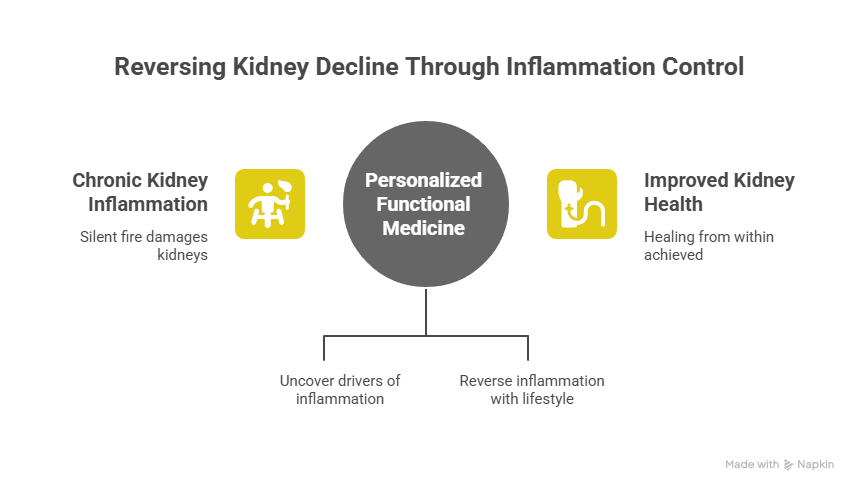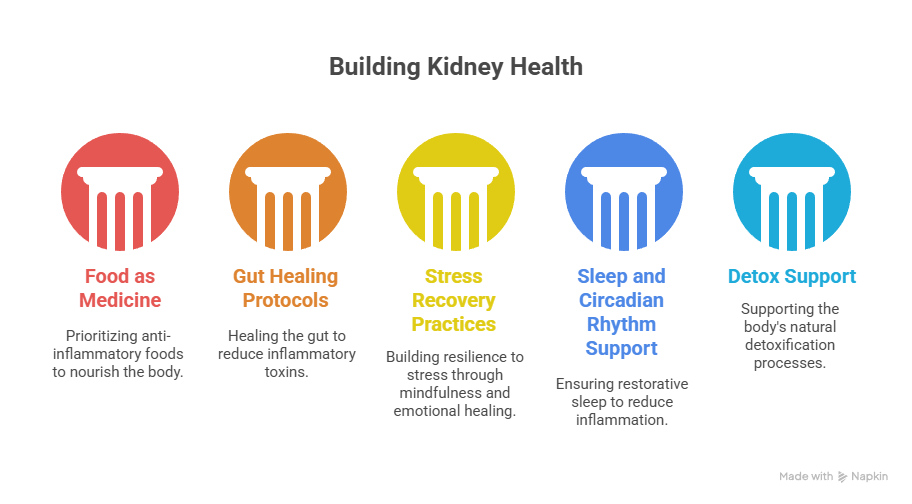
Welcome to another episode of Wellness-Focused with Dr. Bismah Irfan, where we don’t just manage chronic illness, we uncover the root causes, ignite healing from within, and empower you to become an active participant in your own wellness journey.
Today’s topic is one that lies at the core of almost every chronic condition I see in my nephrology practice: inflammation. It’s the silent fire that can quietly burn beneath the surface for years, destroying kidney tissue, accelerating disease, and making you feel fatigued, bloated, and unwell, all without an obvious diagnosis.
Yet, what if I told you that this chronic inflammation is not just a symptom but a driver of kidney decline? And more importantly, what if you could begin to reverse this storm, not with a prescription, but with personalized strategies rooted in functional medicine?
What Is Chronic Inflammation, Really?
Let’s start by clarifying something. Inflammation itself is not bad. In fact, it’s a necessary part of the immune system’s healing response. When you get a cut, your immune system sends white blood cells to the area to fight infection and repair tissue. That’s acute inflammation, and it’s vital.
But when that immune response never turns off, when the body is constantly “on alert” due to poor diet, stress, infections, environmental toxins, or hidden imbalances, the inflammation becomes chronic. And instead of healing the body, it begins to destroy it, slowly, silently, and systemically.
In the kidneys, chronic inflammation leads to progressive scarring, known as fibrosis. Over time, this scarring reduces the kidneys’ ability to filter waste, regulate blood pressure, balance electrolytes, and support overall health.
The Inflammation Cascade: Why It Damages Your Kidneys
Inside your body, chronic inflammation triggers complex signaling pathways that can directly damage the nephrons, your kidneys’ filtering units.
Two of the most destructive inflammatory pathways include:
- NF-κB (Nuclear Factor kappa-light-chain-enhancer of activated B cells): This pathway is like flipping on a fire alarm in every cell, activating pro-inflammatory genes and fueling the production of damaging cytokines.
- NLRP3 Inflammasome: A protein complex inside cells that becomes overactive in response to stress, toxins, or infections. Once activated, it contributes to further cytokine release and kidney tissue injury.
If this sounds technical, just think of it this way: chronic inflammation is like rust inside your kidneys. It doesn’t hurt at first, but it steadily breaks things down, making everything work harder, until function starts to fail.
The good news? You can calm this storm. But you have to know what’s feeding the flames first.
Hidden Fuel Sources: What Drives Chronic Inflammation in Kidney Disease
1. Diet
Highly processed foods, refined sugars, artificial additives, and trans fats are all pro-inflammatory. A standard Western diet rich in processed meats, sodas, and refined carbohydrates fuels oxidative stress and inflammation.
Even foods that seem healthy may trigger inflammation in sensitive individuals, like gluten or dairy, especially if there’s underlying gut permeability (“leaky gut”).
2. Stress and Emotional Burdens
Stress isn’t just a feeling, it’s a biological trigger. Chronic stress activates the HPA (hypothalamic-pituitary-adrenal) axis, raising cortisol levels and triggering inflammatory cytokines. Long-term, this damages kidney tissue and disrupts blood pressure regulation.
Unresolved trauma, emotional suppression, and mental overload are potent inflammatory triggers. Your emotions are not separate from your physiology.
3. Environmental Toxins
Heavy metals, mold exposure, air pollution, and even daily chemical exposures (from cosmetics to cleaning agents) can activate inflammatory pathways. These toxins also place an added burden on your detoxification organs, including your kidneys.
4. Gut Dysfunction
An imbalanced gut microbiome can release endotoxins that leak into your bloodstream and activate systemic inflammation. This is particularly relevant in kidney disease, where gut-kidney axis imbalances amplify the damage.
When your gut is inflamed, your kidneys feel it.
5. Hidden Infections
Chronic infections, like Epstein-Barr virus or underlying bacterial overgrowth, can silently trigger immune activation and low-grade inflammation for years, without any obvious symptoms.
Measure to Manage: The Power of Testing Inflammation
You can’t heal what you can’t see. That’s why in my practice, we go beyond basic lab panels to measure inflammatory markers that help reveal the storm before it becomes destructive.
Some of the most revealing tests include:
- C-reactive protein (CRP): A general marker of systemic inflammation.
- Interleukin-6 (IL-6): A cytokine that rises in both acute and chronic kidney injury.
- Tumor necrosis factor-alpha (TNF-α): A major driver of kidney damage and fibrosis.
- Fibrinogen: Elevated in chronic inflammation and linked to clotting risks.
Once we know what we’re dealing with, we can take targeted, personalized action, not just to suppress inflammation, but to resolve it.
Resolution Over Suppression: Why Anti-Inflammatory Drugs Aren’t Enough
Here’s something conventional medicine often misses: suppressing inflammation is not the same as resolving it.
Steroids or NSAIDs might reduce symptoms temporarily, but they don’t address the root cause, and often come with side effects that further damage kidney health.
Functional medicine focuses on pro-resolving strategies that support the body’s innate ability to put out the inflammatory fire, naturally and sustainably.
Some of the most powerful inflammation-resolvers include:
- Specialized Pro-Resolving Mediators (SPMs): These are compounds derived from omega-3s that actively signal the body to resolve inflammation.
- Phytonutrients: Found in colorful plant foods, especially turmeric (curcumin), ginger, resveratrol, and green tea extract, which help calm inflammatory genes.
- Targeted Supplements: Such as magnesium, vitamin D, and glutathione precursors, which support immune regulation and antioxidant capacity.
The Anti-Inflammatory Lifestyle: A New Blueprint for Kidney Health
You don’t need a magic pill. What you need is a new foundation, a sustainable way of living that reduces inflammation from every angle. Here’s what I’ve seen transform kidney health in my patients:
1. Food as Medicine
Prioritize an anti-inflammatory plate rich in:
- Colorful vegetables and leafy greens
- Omega-3-rich foods like wild-caught salmon, chia, flax, and walnuts
- Antioxidant-rich berries and herbs
- Fiber to feed the gut microbiome
Avoid:
- Sugar and high-fructose corn syrup
- Processed meats and fried foods
- Refined carbs and artificial sweeteners
2. Gut Healing Protocols
Healing the gut reduces a major source of inflammatory toxins. This may include:
- Removing trigger foods and infections
- Supporting digestion with enzymes or bitters
- Rebuilding with probiotics, prebiotics, and gut-healing nutrients like L-glutamine and zinc
3. Stress Recovery Practices
Instead of just managing stress, I encourage building stress resilience. This includes:
- Mindfulness meditation or breathwork
- Nervous system regulation through vagus nerve activation
- Emotional healing through therapy, journaling, or prayer
- Nature exposure and grounding
4. Sleep and Circadian Rhythm Support
Sleep is anti-inflammatory. Period. Aim for:
- 7–9 hours per night of deep, restorative sleep
- A consistent sleep-wake cycle
- Avoiding screens and artificial light 1–2 hours before bed
5. Detox Support
Support your body’s ability to eliminate inflammation triggers through:
- Sweating (infrared sauna or exercise)
- Adequate hydration
- Liver-supportive foods (cruciferous veggies, beets, dandelion)

Why Personalization Matters
Two patients can both have kidney disease, but with completely different root causes. One may have inflammation driven by mold exposure, another by chronic stress and gut dysfunction. That’s why personalized medicine is the future.
In my practice, we don’t offer one-size-fits-all plans. We look at your full story, your labs, your environment, your values, and craft a healing strategy that fits your body and your life.
Sometimes, this means digging deep. But the reward is profound. I’ve seen patients stabilize their kidney function, reduce their proteinuria, and even gain back energy, clarity, and vitality they thought was gone forever, simply by calming the inflammation storm.
Final Thoughts: You Can Heal from the Inside Out
If you take one message from today’s conversation, let it be this:
Chronic inflammation is not your fate, it’s a signal.
It’s your body asking for help, for change, for alignment. And the power to respond lies in your hands.
You are not powerless. You are not broken. You are not destined to slowly decline. By taking a root-cause, functional approach, you can create space for healing, deep, cellular, life-giving healing.
So whether you're already diagnosed with kidney disease or you're trying to prevent it, I encourage you to get curious about inflammation, to listen closely to what your body is telling you, and to work with practitioners who see you as a whole person, not just a lab value.
Because healing doesn’t just happen in your kidneys. It happens in your mind, your gut, your lifestyle, your choices, and your belief that better is possible.
Until next time, I’m Dr. Bismah Irfan, helping you get to the root of wellness, one step at a time.
🌟 Special Offer: Take $50 off your first visit and discover how personalized, root‑cause medicine can transform your health.
If you're ready to address nutrient gaps, explore functional testing, or redefine your kidney care journey, please visit ivitalitymd.com or drbismah.com. Knowledge is powerful—but applied knowledge restores vitality.
